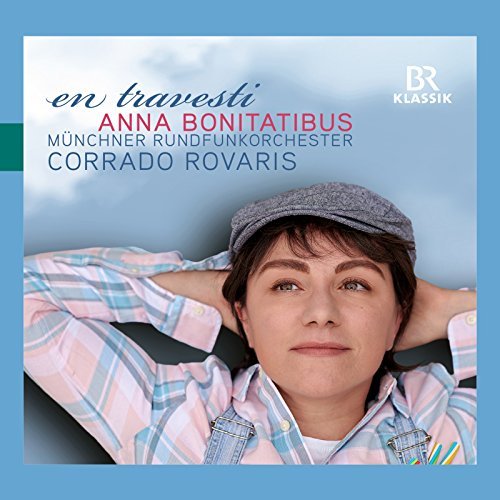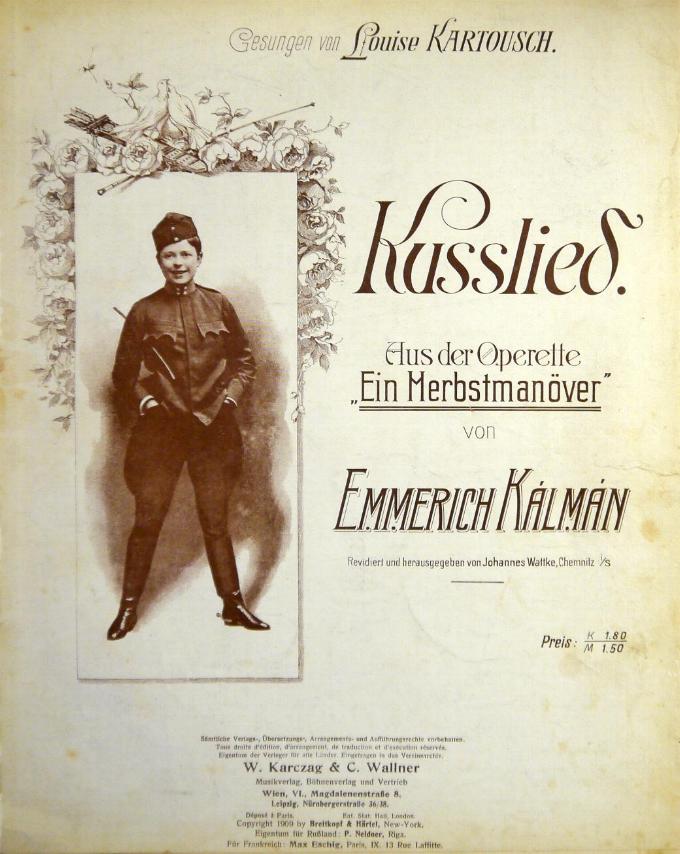Kevin Clarke
Operetta Research Center
20 February, 2018
Recently, gender and diversity Prof. Simon Dickel gave an interview on Deutschlandfunk talking about his new book Queer Cinema which looks back at cinematic developments in the past 25 years. In the interview Mr. Dickel is asked whether “queer themes” are still an issue when so many of them have successfully found their way into mainstream culture and mainstream cinema (and TV series). He replies that maybe “trans is the new queer” and that the discussion about queerness has shifted – it’s now about “transgender representation” (as in the award winning Amazon series Transparent) and it’s about “intersectionality,” meaning the combination of various “differences” and “discriminations,” such as sexual orientation, disability, race, class etc. You can apply nearly all of these aspects to operetta too, even if no book called Queer Operetta has come out yet. It’s nevertheless a hot issue, so to speak, and the debate about trans* themes is omnipresent today, also in musical theater. So it’s not surprising that mezzo soprano Anna Bonitatibus and the Münchner Rundfunkorchester have released a new album called en travesti, dedicated to cross-dressing roles that range from Vivaldi and Händel to Offenbach and – get ready for it! – Henry Mancini.

The CD cover for “en travesti” with Anna Bonitatibus. (Photo: BR Klassik)
The album was recorded in Munich, and you might recall that it was the Munich theater museum which recently presented a catalogue called Ein Bild von einem Mann – gespielt von einer Frau. Die wechselvolle Geschichte der Hosenrolle auf dem Theater, which translates as “The perfect picture of a man, played by a women. The varied history of trouser roles in theater.” Perhaps that gave Miss Bonitatibus and the BR Klassik crew the idea to tackle such an album?

The cover of the Munich Theatermuseum publication “Ein Bild von einem Mann – gespielt von einer Frau.” (edition text + kritik)
It starts out pretty much like what you’d expect from an opera mezzo soprano: Radamisto by Händel, Farnace by Vivaldi, and Tancredi by Rossini. That’s standard fare, right? (Maybe even Capuleti e Montecchi by Bellini.) But the latter tracks on this album are somewhat unusual: Donizetti’s Maria di Rohan (1843), Berlioz’s version of Gluck’s Orphée et Euridice (1859), Meyerbeer’s Urbain aria from Les Huguenots (not the famous waltz, but instead “Non! … non … vous n’avez jemais, je gage.”) From the vast repertoire of Offenbach’s trouser roles, Miss Bonitatibus – sadly – selects a number from Les Contes d’Hoffmann, but again not an all-familiar one, instead “Vois sous l’archet frémissant.” It’s pretty gloriously sung, though not too memorable as a piece.
Here, as elsewhere, you’ll notice a quick vibrato in her voice that suggests arousal and energy. It also suggests pubescent feelings, somehow, that are very fitting for these trouser roles. It’s still a very full vocal sound – matching the full orchestra sound unleashed by conductor Corrado Rovaris – and it’s a sound that plays effectively with androgyny, even if Miss Bonitatibus is miles away from someone like Zarah Leander.
The album leads to the one final track that really stands out: Henry Mancini’s “Crazy World” from the film Victor/Victoria (1982). It doesn’t happen very often that an opera singer ventures into Julie Andrews territory with eyes wide open.
I must confess this one title alone caught my immediate interest when I saw the announcement for the disc, and it made me want to have the CD. Hearing this beloved song sung by Miss Bonitatibus with piano accompaniment and background orchestra, as in the movie, is a strange experience. The opulent opera voice sounds bizarre in this intimate soliloquy and doesn’t quite capture the direct emotional impact of Miss Andrews. (Okay, it’s tough competing with Julie Andrews, I admit, but you can try.) The lovely words don’t come out as casually as with Miss Andrews, which reminds us how hard it apparently is for opera singers – even in a studio and in front of a microphone – to put their opera attitude aside for a moment and dare to adapt to a different style. (Few have successfully managed doing it, Kiri te Kanawa on some recordings does it rather well, I think; but that’s an issue many people have strong opposing opinions about.)
Including Mancini on such a BR Klassik disc is surely a novelty in the series. And notwithstanding my stylistic reservations about the interpretation it’s a welcomed surprise. Not because it’s cross-over between classic opera and musical comedy, but because it shows that the gender bending so beloved by opera people in the 18th and 19th century extends way into the 20th century and into the 21st century, too. When you think about it, it’s sad that there are not more recent examples included on this disc, just for the balance. After all, Victor/Victoria is from the 1980s. We have moved 30 year on, and we look at a woman ‘playing’ a man ‘playing’ a woman ‘playing’ a man differently today. And we also look at homosexuality differently today than Blake Edwards did in his film back then, just before the AIDS crisis hit and discussion about ‘sexual minorities’ and ‘tolerance’ shifted radically in the Ronald Reagan years of presidency.
Considering how many 19th century operetta examples there also are – apart from Prinz Orlowsky in Fledermaus – it’s a pity that none of them are included on en travesti. The voice of Anna Bonitatibus would probably sound great in Suppé’s Boccaccio or Fatinitza, as the king in Strauss’ Das Spitzentuch der Königin, as Henri in Heuberger’s Opernball, as Sonja in Lehár’s Der Zarewitsch or with the “Kusslied” from Kalman’s Herbstmanöver. To name just a few famous examples.

Sheet music cover for Kalman’s “Kusslied” from “Ein Herbstmanöver,” originally sung my Louise Kartousch.
Some of these operetta trouser roles would allow us to ask more in-depth questions about the representation of trans* themes, from a historical perspective and from today’s point of view. And some of these roles also allow us to pose the question of intersectionality: how does sexual orientation or being a woman in a patriarchal society affect these characters and original interpreters, how do race and class come into play, e.g. in the case of Offenbach’s Good Man Friday/Vendredi in Robinson Crusoé, a black face role in Paris 1867?

Célestine Galli-Marié as Vendredi in Offenbach’s “Robinson Crusoé,” caricature by André Gill (1867).
Perhaps that’s the next step and Miss Bonitatibus’ next album? It would certainly be interesting if BR Klassik would venture further down this road in future releases. If they need inspiration they can always consult the Ein Bild von einem Mann catalogue and read pages 226 ff.
Since queer themes have entered mainstream culture so massively, as Simon Dickel outlines, and since trans* is the new queer, it would be great to hear and see and read more about it in the context of musical theater, including operetta. There’s so much so discover and enjoy, and talk about.

so well written! and its a lovely cd, bonitatibus is a great singer!!!